Missouri American Water customers in Jefferson City, Mexico and St. Charles had the opportunity to voice their thoughts about a proposed rate increase case that will be decided by the Missouri Public Service Commission.
On June 30, MAW filed water and sewer rate cases with the PSC seeking to increase annual water and sewer revenues by approximately $73.5 million (21.1 percent). At the time, company officials said the main reason for the request was a $950 million statewide investment in water and sewer systems the company was making 2018 through mid-2022.
The rate review includes $920 million in water system improvements and $30 million in sewer system improvements, MAW officials said.
Investments in the rate review include replacement of about 275 miles of aging water and sewer pipelines, and an upgrade of treatment plants, storage tanks, wells and pumping stations across the state. This included replacing the Jefferson City water treatment plant's clear well, which was built in 1888.
Based on the filing documents, MAW filed one rate statewide for water. Company officials said they filed for a "future test year."
Normally, MAW files for investments that have already been made. This filing is looking forward and asking for investments made through May 2022.
If the PSC granted the full MAW request, a typical customer using 3,000 gallons of water per month and currently paying $27.74 would see a $5.21 increase that would bring their monthly bill to $32.95. A typical customer using 5,000 gallons of water per month and currently paying $40.23 would see a $6.68 increase to bring their monthly bill to $46.91.
MAW does do sewer service in Wardsville. Customers currently pay $58.13 per month, but if the PSC would grant the full increase request, the cost would rise to $69.98 a month. Company officials said increases in the regulations for operating sewer systems are leading to higher costs.
Some Wardsville customers expressed frustration over the fact sewer customers are charged flat rates which don't take into account the amount a customer uses like how it's done for water customers.
"Low amount users pay the same rate as someone with a high amount," Wardsville customer Jon Stambaugh said. "I think they should pro-rate the charge. We're looking at a 20 percent increase for us."
Lisa Forck lives in Lake Vanloo, just outside of Wardsville, where more than 100 households are located and she also had trouble understanding why low and high volume users would pay the same amount.
"We have septic tanks which we had to pay thousands of dollars to put in, and we have to spend $300-$400 to pump them out," Frock said. "We get the same charge as those on a system that have to make major upgrades. We're not on the same system, and those upgrades don't impact us. This needs to be looked at more fairly."
William Zeaman, of Holts Summit, is part of the Golden Ponds Homeowners Association which gets sewer service from Missouri American. He too felt the flat rate was unfair.
"A pay as you go system is what I support," Zeaman said. "We have a gravity system, and it's not high maintenance."
Zeaman also said some people in the subdivision haven't been billed in several months and wanted PSC officials to make sure all are paying. PSC staff said they would be getting back with him about that.
President of Missouri American Water President Debbie Dewey said they have usually been coming to the PSC with a rate request every three years.
"The majority of our rate request is tied to what it takes to maintain these systems," she said. "Those are our fixed cost and not so much on the volumetric use. Changes in permit requirements have also increased, and the treating of wastewater is more and more complex."
MAW officials noted they usually don't get exactly what they ask of the PSC. They believe sometime around the end of May the PSC should have a decision on this case.
Because of the ongoing COVID-19 pandemic, the PSC has been conducting virtual public hearings for this rate case. Officials from all parties involved said most of the virtual hearings have been well-attended with many residents calling in to ask questions or give testimony. They believe this may be the way the PSC holds pubic hearings in the future.

